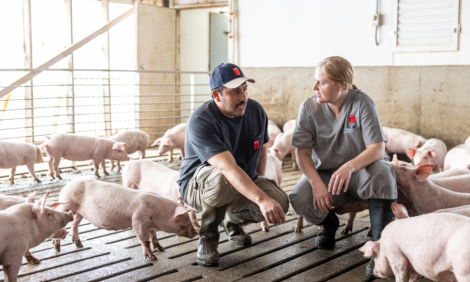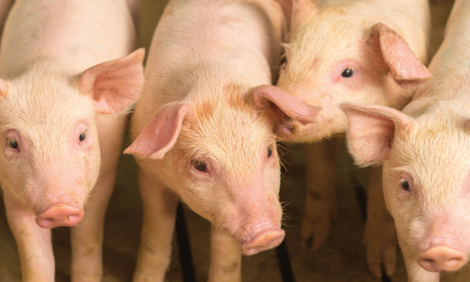



Challenges of Pig Farming in Cameroon - Surviving in a World Without Meatpackers
Pig production in Cameroon as in many countries of Sub-Saharan Africa requires good pioneering skills. With only a minimum of organised trade, high feed costs and a high disease pressure, being successful could hardly be a larger challenge. Jonas Tchenda has managed since 1978, writes Jean Armand Bokally Dande.Forget about integrations, super-market chains squeezing out margins or meatpackers dominating markets. For this feature we are in a country where these parties yet have to come into existence. In Cameroon, the pig farm of Jonas Tchenda is among the largest that can be found with about 400 pigs. And he sells his finishers directly to retailers or to individuals organising festivals, to avoid the hassle of the market.
Tchenda, age 61, is based in Nkozoa village, a suburb of the capital Yaounde.
His family-operated farm houses a broad variety of animals on a surface of about 200 m2. Not only sows, weaners and finishers, but also guinea fowl, geese, ducks and chickens. Exactly how many pigs he sells per year he prefers to keep quiet, but he does sell them at various ages both after weaning so others can use them for further growing, and at about two years. At that age, the pigs are nice and heavy and can bring in between 300,000 and 400,000 francs (CFA), roughly between €450 and € 600.
Facing multiple challenges
With that, Tchenda is doing good business, as pig farming in Cameroon comes with quite a number of constraints. For years, the development has been halted by diseases like swine influenza, reproductive disorders and parasites.
Additionally, African Swine Fever (ASF) proved to be a big problem during 2014, causing strong price rises as it decimated the country’s pork supplies. On top, feed costs are usually relatively high. Zooming in on the pig industry itself, the sector still has a long way to go.
On-farm, management challenges lead to a relatively low prolificacy rate and a high rate of in-breeding. On a broader scale, pig farmers are barely organised, which doesn’t help when aiming to build up proper marketing channels. Certified slaughter or processing facilities are absent, either of which could guarantee quality meat. It explains why Tchenda chooses to search his own way for marketing his meat, concluding, “For pork, there is no space reserved in Yaounde markets. Therefore each producer is organised as he sees fit.”
Complex
The Tchenda complex is divided into several compartments of 9 m² each containing one or two hybrid pig breeds. The animals are a mixture of Large White, Duroc and sometimes local breed genetics, which according to Tchenda, ‘are more resistant to disease outbreaks’.
Crossbreeds offer one more advantage, he says, as they grow quicker, “A good pig breed is the one that weighs at least 80 pounds (36 kg) in six months.” As a precaution, he mostly uses parent stock from his own farm, since others are often vague about the age of their animals. In order to maintain his herd, some of the pigs get a special treatment not every male is castrated, and some gilts destined to be breeding animals receive a leaner feed than others, to ensure good breeding qualities.
Tchenda obtains his feed from the Institute of Agricultural Research and Development (IRAD) which is located in Nkolbisson, about 6 km east of Yaounde. In addition, he also grows it himself or purchases it from other pig breeders, especially those from western Cameroon. He feeds his pigs with a mixture of ingredients, including brewery grains obtained from the Cameroon Breweries Company, palm kernel meal, corn, and cotton cake. In addition, often used elements are soybeans, peanuts, fish meal, wheat bran, bone meal, sea shells, palm oil and pre-mixes.
Tchenda adds, “The proportions of the components vary according to the types of pigs. For example, the proportion of corn, peanuts and other fat- containing products found in the feed for breeding pigs is reduced by 50% compared to pigs for commercial purposes.”
Confidence
The future is nevertheless promising for Tchenda and his peers. With developments like the recent ebola outbreaks, consumption of bush meat is increasingly shunned, if it is not banned from sale in many Cameroonian localities for prevention reasons.
Instead, pork is becoming more popular in homes, restaurants and even street roasters. A higher level of organisation is therefore required.
In this perspective it is noteworthy to point to a state project called ‘Improvement of Agricultural Competitiveness’ (PACA). In collaboration with the Ministry of Livestock, the country recently imported 73 breeding pigs from France seven males and 66 females. This may be a small step on a world scale, but a giant one for Cameroon to bring high performance and new blood to the industry.
And strongly that the program called "Agropoles" lauched the 6th of August 2012 by the Prime Minister of Cameroon, Philemon Yang, which is an economic program of regional planning for the promotion of business of average importance in the rural sector in Cameroon and whose objective "is the promotion of agro-pastoral businesses on the territory "carries the desired results.
No matter what is the challenges in the Cameroonian market, this situation never caused Tchenda to lose his determination or enthusiasm. Since 1978 he has seen the sector evolve, which makes him now one of the veterans of Cameroon’s pig industry. He managed to build up a good reputation and makes a good living out of it. His residence also has many shops store front and he’s managed to send all his children to school.






